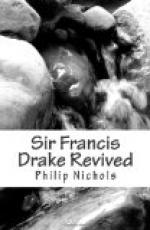They have every one of them two sorts of arrows: the one to defend himself and offend the enemy, the other to kill his victuals. These for fight are somewhat like the Scottish arrow; only somewhat longer, and headed with iron, wood, or fish bones. But the arrows for provision are of three sorts, the first serveth to kill any great beast near at hand, as ox, stag, or wild boar: this hath a head of iron of a pound and a half weight, shaped in form like the head of a javelin or boar-spear, as sharp as any knife, making so large and deep a wound as can hardly be believed of him that hath not seen it. The second serveth for lesser beasts, and hath a head of three-quarters of a pound: this he most usually shooteth. The third serveth for all manner of birds: it hath a head of an ounce weight. And these heads though they be of iron only, yet are they so cunningly tempered, that they will continue a very good edge a long time: and though they be turned sometimes, yet they will never or seldom break. The necessity in which they stand hereof continually causeth them to have iron in far greater account than gold: and no man among them is of greater estimation, than he that can most perfectly give this temper unto it.
Every day we were marching by sun-rising. We continued till ten in the forenoon: then resting (ever near some river) till past twelve, we marched till four, and then by some river’s side, we reposed ourselves in such houses, as either we found prepared heretofore by them, when they travelled through these woods, or they daily built very readily for us in this manner.
As soon as we came to the place where we intended to lodge, the Cimaroons, presently laying down their burdens, fell to cutting of forks or posts, and poles or rafters, and palmito boughs, or plantain leaves; and with great speed set up the number of six houses. For every of which, they first fastened deep into the ground, three or four great posts with forks: upon them, they laid one transom, which was commonly about twenty feet, and made the sides, in the manner of the roofs of our country houses, thatching it close with those aforesaid leaves, which keep out water a long time: observing always that in the lower ground, where greater heat was, they left some three or four feet open unthatched below, and made the houses, or rather roofs, so many feet the higher. But in the hills, where the air was more piercing and the nights cold, they made our rooms always lower, and thatched them close to the ground, leaving only one door to enter in, and a louvre hole for a vent, in the midst of the roof. In every of these, they made four several lodgings, and three fires, one in the midst, and one at each end of every house: so that the room was most temperately warm, and nothing annoyed with smoke, partly by reason of the nature of the wood which they use to burn, yielding very little smoke, partly by reason of their artificial making of it: as firing the wood cut in length like our billets at the ends, and joining them together so close, that though no flame or fire did appear, yet the heat continued without intermission.




